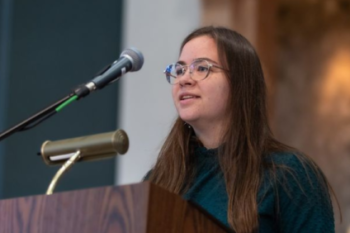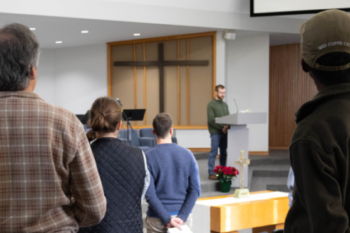Advent: Cultivating Joy as Resistance
As we enter in the holy presence of God this week, we gather ourselves around the pink candle which marks what was traditionally known as “Gaudete Sunday,” literally, “Rejoice” Sunday. The rose-colored candle that stands in the cocoon of the Advent wreath is a symbol to remind us of the joy that the world experienced at the birth of Christ, our savior. We light the candle as we approach the darkest day of the year, the Winter Solstice. It signifies how Christ came as a divine light into the dark world and welcomed us to rejoice in it.
We read the promises of healing and freedom, and it hits us like that mug of cocoa – a portion of comfort food for our tired souls. It is finally becoming real. The prophecy is about to come true. Christmas is approaching, and we will witness the most miraculous event of all ages happening all over once again. The joy that is scented with an aroma of sweet liberation is swirling up in the air as apostle Paul reminds us with his words, “The Lord is near. Rejoice!”
Rejoice in the Lord always. I will say it again: Rejoice! Let your gentleness be evident to all. The Lord is near. Do not be anxious about anything, but in every situation, by prayer and petition, with thanksgiving, present your requests to God. 7 And the peace of God, which transcends all understanding, will guard your hearts and your minds in Christ Jesus. (Philippians 4:4-7)
When Gabriel shared the news of the century to her, Mary looked beyond the uncertainties of the future and declared, “My soul glorifies the Lord, and my spirit rejoiced in God my Savior.” Like Mary, we are challenged to look beyond our troubles and embrace the coming of the Lord with joy in our hearts. For Paul declares, “Rejoice in all the goodness that is found in God and His blessing.”
As I think about all of this, I am reminded of the faith of a community of people who live in the heart of the East Burmese jungle near the Thailand border. This wild, hilly strange land is not a suitable habitat for humans, but it is home to hundreds of Kayin refugees who fled their villages due to the unrest attacks by the Myanmar military. Inside the nightmare refugee camps that spread across the hill, one witnesses the complete darkness of the reality of our fallen world. It seems like sorrowness has conquered every corner of the earth. Nonetheless, the most beautiful testimony of God bloomed in this deserted, forgotten land of the Eastern Burma.
Joy is something that is born out of our pain.
For the Christian Kayin, December marks a sacred and joyous month of the year. They celebrate December 1, also known as “Sweet December,” with festive activities to honor and welcome the month just as we welcome new year. Every year, on the shivering cold night of November 30, they would travel from house to house with a burning candle in their hand, protecting it with the other palm so that it would not die by the wind, and announce the coming of the Lord with a song like, “Joy to the world, the Lord has come…”
When she was asked by humanitarian organization called the Free Ranger Burma about why Kayin still celebrate Christmas in the jungle on the run, a community elder Maw La answered, “God loves us so much that He sent His only son Jesus to save us. Some people killed him, but He rose again and is with us always. We believe and celebrate Christmas for the same reason as other Christians around the world.” How convicting to witness a group of marginalized people welcoming the Christ child in the midst of the hell they are going through! I cannot help but wonder how the Christian Kayin cultivate their joy in the midst of their unmerited suffering. Everything they know and love has been taken away from them in the most horrible ways. How can they still sing the song of joy?
In his endeavour to define joy, theologian Willie James Jennings profoundly states, “Joy is an act of resistance against despair and its forces.” Joy is indeed something that is born out of our pain. “Joy in that regard,” he says, “is a work, that can become a state, that become a way of life.” Joy cannot be separated from sorrow. The famous poet Khalil Gibran also understood the paradoxical relationship of joy and sorrow:
When you are joyous, look deep into your heart and you shall find that what has given you sorrow may also hold deep joy. When you are sorrowful look again in your heart, and you shall see that in truth you are weeping for that which has been your delight. (Joy and Sorrow)
For the Christian Kayin, their lives become meaningful and purposeful when the grief that they experience because of the broken world and the joy that they found in Christ get intertwined together. They are able to look beyond the complexity of life and bravely declare, “My soul glorifies the Lord, and my spirit rejoiced in God my Savior.” The way they hold onto their faith in salvation and choose to see the goodness regardless of their circumstances helps us see the mystic power of the gospel once more. As a result of their gentle faith, “Sweet December” is celebrated by the Christians in all over Burma today.
Joy is found at the interconnection of our grief with Christ.
As we approach to the final week of advent, I would like to boldly invite you to remember not only the joy but also the sorrow you have experienced this year. I believe all of us have experienced some kind of loss in our life because of the pandemic alone. The loss of loved ones, companionship, stability, peace, identity, freedom, health, and so on. Let us bring all of our burdens to the feet of the Lord and find comfort in His promises together. In this way, may we cultivate the joy in our life that we have found in our Lord savior Jesus Christ who brings beauty from ashes.
“Weeping may stay for the night, but rejoicing comes in the morning.” (Psalms 30:5b)
Ngwa Cherry is an alum of Emmanuel Christian Seminary at Milligan. View Emmanuel’s Academic Programs page here.





